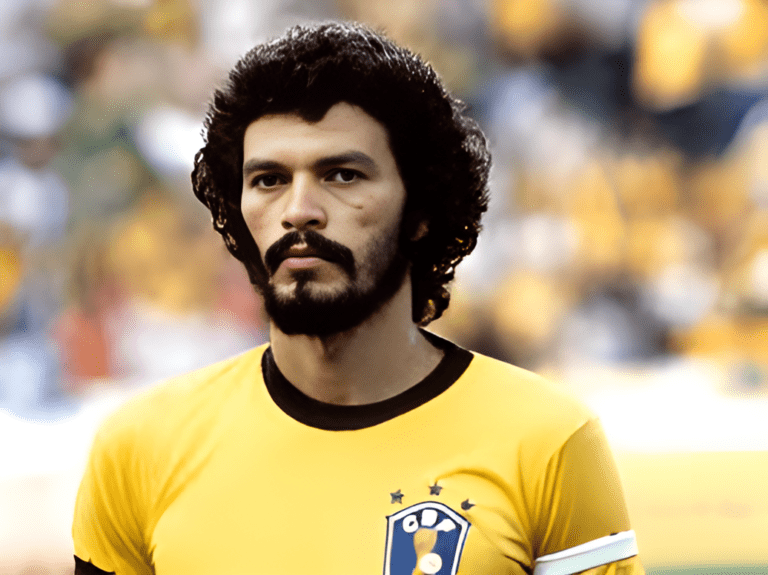Sócrates Brasileiro Sampaio de Souza Vieira de Oliveira, simply known as Sócrates. Was one of the greatest Brazilian footballers of all time. Born on February 19, 1954, in Belém, Brazil. Sócrates was not only a great footballer. He was a brilliant footballer known for his intelligence, leadership, and activism. Sócrates was a crucial figure in Brazilian football during the late 1970s and the 1980s. He was known for his unique style of play, vision, and elegant passing techniques. Sócrates was not only a brilliant footballer but also a doctor and a lifelong political activist who caused democracy in Brazil.
Sócrates’s career is highlighted by a period spent in Italy with Fiorentina, but he mostly spent his football in Brazil. Moreover, Sócrates was given the captain’s armband for the 1982 World Cup. And it was here that he solidified his leadership even more. The following are his career statistics.
Match Records and Career Stats
- Total Club Matches – 297
- Total Club Goals – 94
- National Team Matches – 60
- National Team Goals – 22
The Brazilian captain was renowned for how calmly he approached the game. How meticulously he controlled the play from the midfield. Sócrates was not much of a goal-scoring midfielder, but his goals were always crucial. He was a creative midfielder who could score decisive goals for his team when required. The following is a brief visualization of his goals record, and the table gives a better record:
Major Victories & Achievements
Sócrates reached the peak of his career with some individual awards and trophies at Corinthians. He also played for Brazil at two World Cups in his short career, writing unforgettable stories on the world stage.
Club Achievements:
Campeonato Paulista (São Paulo State Championship) —
- 1979 (Corinthians)
- 1982 (Corinthians)
- 1983 (Corinthians)
Brazilian National League
- 1985 (Flamengo)
Corinthians Democracy Movement
- While there was no silverware, Sócrates was a driving force behind the famous Corinthians Democracy that advocated for player involvement in club decisions during the 80s.
International Performance:
- Copa América Runner-Up
- 1983 (Brazil)
- World Cup Participation
- 1982 (Brazil – Captain)
- 1986 (Brazil)
Although Sócrates never lifted the World Cup, his captaincy and displays in 1982. Were among the most memorable of all-time in Brazilian football.
Family and Personal Life
Sócrates was from an affluent family and managed to get a degree in medicine while playing football, something almost unheard of for professional athletes. His younger brother, Raí, went on to be a legendary Brazilian footballer as well — continuing the La Famiglia reputation.
Married with six children, Sócrates In his personal life, was devoted to the growth of education and medicine, as well as fighting for various politicians. His intellectual curiosity was such that he would frequently hold forth on philosophy, politics and social matters with team-mates or the media.
Sócrates was a smoker and had a vast social life off the pitch. However, his lifestyle finally began to take its toll on his health. He died on December 4, 2011, due to food poisoning and pediatric intestinal infection.
Breaking News/ Updates
It is more than a decade since Sócrates died but he remains such a giant figure in Brazil and beyond. Corinthians had confirmed the construction of a memorial in which will be destined to homage the life and career of Sócrates, =[13] in 2024. The tribute will manifest in a permanent exhibition that celebrates his influence on both football and society.
Recent documentaries and books have also detailed the life of Sócrates, including his involvement in the Corinthians Democracy Movement, which fought Brazil’s military dictatorship during the 1980s. He was not only a footballing leader but became a symbol of the struggle for freedom and democracy in Brazil at that time.
Plus a lot of those opinion formers and fans in the football community have been busy over the past 24-48 hours, reflecting on Socrates’ impact on Brazilian football culture. Aptly described as the thinking man’s footballer seeking to practically unite both football and intellectual-political ideals, he remains a guiding light for many players current and yet unborn in generations going.
Net Worth & Financial Information
Although accurate figures on Sócrates’ net worth have never been released to the public, his fortune was thought to be minuscule in contrast with modern-day footballers. He earned his living through Football mostly and was a doctor by profession after retirement and later on served as a football commentator. This wealth also encompassed the money from his public appearances and sponsorship deals, especially that of Corinthians.
According to all of the interviews of people who are still alive, including his ex-wife and ex-lover that I looked for in English yesterday when the news came from Brazil Globo, he was born in poverty; and led a very simple life despite being world famous; never cared about money, although could have made much more than he did playing in Europe (and making huge parties until 10 a. m.) and wanted always to work with social issues. His real legacy is not his economic status, but what he realized in football and politics and in all of Brazilian society.
